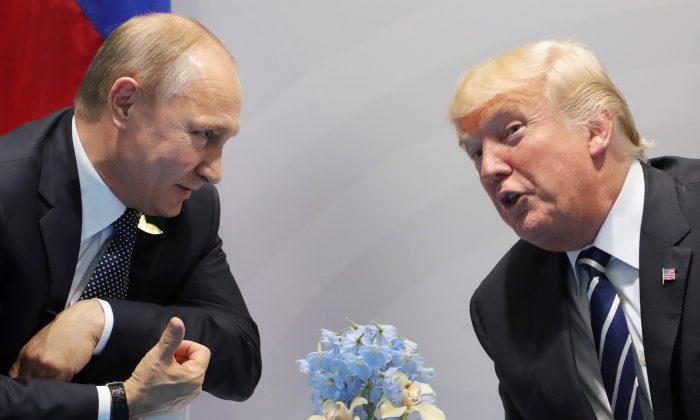The United States, Russia, and Jordan have reached a ceasefire deal that will take effect in the southwestern portion of Syria on Sunday, July 9.
Secretary of State Rex Tillerson announced the deal at a press conference in Hamburg, Germany, on Friday.
Described as a “de-escalation agreement,” the deal comes after President Donald Trump and Russian President Vladimir Putin met in Hamburg on the sidelines of the G20.
Tillerson described the ceasefire as a “well defined agreement” that would secure a “very complicated part of the Syrian battlefield.”
A senior State Department official involved in the negotiations said the deal was a stepping stone to a more comprehensive agreement, which secures a line of contact that defines boundaries between the combatants—a foundational element of any lasting peace agreement, he said.
Yet to come are detailed monitoring agreements to ensure the ceasefire is honored. The official said those were less difficult to negotiate than the lines of contact.
The area, which has seen escalating violence since February, gives Russia and the United States a place to start establishing the trust and cooperation needed to build a wider peace agreement in Syria.
With a variety of conditions and fighters across the country, it is much harder to establish the kind of nation-wide ceasefire that was previously attempted.
“It is a very complicated battle space. We are starting with fairly modest ambitions,” said the official.
But he warned there were “spoilers on the ground,” including ISIS, al Qaeda, and the Syrian regime who may want to wreck the ceasefire.
Russia, however, seemed sincere in its desire to back the ceasefire, said the official, adding that it was “worth our effort and our time to test them on this.”
Early that day Tillerson had voiced optimism that Russia and the United States could make constructive steps on the wider Syria issue.
“I think this is our first indication of the U.S. and Russia being able to work together in Syria, and as a result of that we had a very lengthy discussion regarding other areas in Syria that we can continue to work together on to de-escalate the areas,” Tillerson said.
Russian Foreign Minister Sergei Lavrov told Russian state-owned media Tass that the United States had committed all parties in the region to a ceasefire.
Russia will put boots on the ground to keep the peace.
“At first, the security around this zone will be ensured with the use of the personnel and resources of the Russian military police,” Lavrov said in Hamburg on Friday.
Russia, the Syrian regime’s main international backer, joined the Syrian conflict in force to prevent the President Bashar al-Assad regime from falling to rebel forces. Iran-backed Hezbollah fighters also support the Assad regime.
The conflict has killed nearly half a million people according to the Britain-based Syrian Observatory for Human Rights.
Millions more have fled the country, sparking an international refugee crisis.
The deal comes two days after Tillerson made a statement on how the situation in Syria is to move forward.
He set out three key requirements: stability on the ground, a political process to achieve a settlement that “charts a way forward for the Syrian people,” and for Russia to play a role in both those efforts.
“Actors in Syria must remember that our fight is with ISIS,” said Tillerson in a press statement on July 5. “We call upon all parties, including the Syrian government and its allies, Syrian opposition forces, and Coalition forces carrying out the battle to defeat ISIS, to avoid conflict with one another.”






Friends Read Free